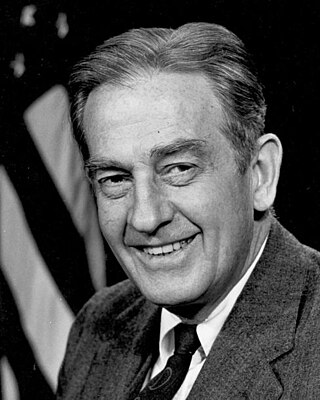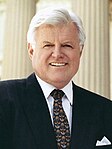
The 2000 United States Senate elections were held on November 7, 2000. The elections coincided with other federal and state elections, including the presidential election which was won by Republican George W. Bush. These elections took place 6 years after Republicans had won a net gain of eight seats in Senate Class 1. Despite George W. Bush's victory in the presidential election, the Republicans lost four senate seats, the most a winning president's party has lost since the passage of the 17th Amendment. This election marked the first election year since 1990 where Democrats made net gains in the Senate. Democrats defeated incumbent Republicans in Delaware, Michigan, Minnesota, Missouri, and Washington, and they won an open Republican-held seat in Florida. In Missouri, the winner was elected posthumously. The Republicans defeated Democratic incumbent Chuck Robb in Virginia, and won an open seat in Nevada. Additionally, Republican Senator Paul Coverdell of Georgia died earlier in the year and was replaced by Democratic appointee Zell Miller, who then went on to win the special election.

The 1994 United States Senate elections were held November 8, 1994, with the 33 seats of Class 1 contested in regular elections. Special elections were also held to fill vacancies. The Republican Party took control of the Senate from the Democrats. Like for most other midterm elections, the opposition, this time being the Republicans, held the traditional advantage. The congressional Republicans campaigned against the early presidency of Bill Clinton, including his unsuccessful healthcare plan. Democrats held a 56–44 majority, after having lost a seat in Texas in a 1993 special election.

The 1982 United States Senate elections were held on November 2, 1982. They were elections for the United States Senate following Republican gains in 1980. The 33 Senate seats of Class 1 were up for election in 1982. A total of four seats changed hands between parties, with Democrats winning seats in New Jersey and New Mexico, and Republicans taking seats in Nevada and the seat of the lone independent, Senator Harry Byrd Jr., in Virginia. Democrats made a net gain of one seat bringing them to 46 seats, while Republicans stayed at 54 seats for a majority. However, the Democratic gain in New Jersey replaced a Republican that had been appointed earlier in the year. Liberal Republicans senators in Connecticut, Rhode Island and Vermont held onto their seats, keeping the Senate in Republican hands.

The 1980 United States Senate elections were held on November 4, coinciding with Ronald Reagan's victory in the presidential election. The 34 Senate seats of Class 3 were contested in regular elections. Reagan's large margin of victory over incumbent Jimmy Carter gave a huge boost to Republican Senate candidates, allowing them to flip 12 Democratic seats and win control of the chamber for the first time since the end of the 83rd Congress in January 1955. This was the first time since 1966 that any party successfully defended all their own seats.

The 1970 United States Senate elections was an election for the United States Senate. It took place on November 3, with the 33 seats of Class 1 contested in regular elections. Special elections were also held to fill vacancies. These races occurred in the middle of Richard Nixon's first term as president. The Democrats lost a net of three seats, while the Republicans and the Conservative Party of New York picked up one net seat each, and former Democrat Harry F. Byrd Jr. was re-elected as an independent.

The 1968 United States Senate elections were elections for the United States Senate. Held on November 5, the 34 seats of Class 3 were contested in regular elections. They coincided with the presidential election of the same year. The Republicans picked up five net seats in the Senate. This saw Republicans win a Senate seat in Florida for the first time since Reconstruction.

The 1964 United States Senate elections were held on November 3. The 33 seats of Class 1 were contested in regular elections. Special elections were also held to fill vacancies. They coincided with the election of President Lyndon B. Johnson by an overwhelming majority, to a full term. His Democratic Party picked up a net two seats from the Republicans. As of 2023, this was the last time either party has had a two-thirds majority in the Senate, which allowed the Senate Democrats to override a veto, propose constitutional amendments, or convict and expel certain officials without any votes from Senate Republicans. However, internal divisions would have prevented the Democrats from having done so. The Senate election cycle coincided with Democratic gains in the House in the same year.

The 1960 United States Senate elections coincided with the election of John F. Kennedy as president on November 8, 1960. The 33 seats of Class 2 were contested in regular elections. A special election was also held on June 28, 1960, for a mid-term vacancy in North Dakota where Democrats flipped a seat to expand their majority to 66–34. As Majority Leader Lyndon Johnson was elected Vice President, Mike Mansfield became the new majority leader.

Clifford Philip Case Jr., was an American lawyer and politician. For over 30 years, Case represented the state of New Jersey as a member of the Republican Party both in the U.S. House of Representatives (1945–1953) and the U.S. Senate (1955–1979).

The 1982 United States Senate election in Massachusetts was held on November 2, 1982. Incumbent Democratic U.S. Senator Ted Kennedy won re-election to his fifth term.

The 1988 United States Senate election in Massachusetts was held on November 8, 1988. Incumbent Democratic U.S. Senator Ted Kennedy won re-election to his sixth term.

The 2008 United States Senate election in Illinois was held on November 4, 2008. Incumbent Democratic U.S. Senator Dick Durbin sought a third term in office and faced minimal opposition from Republican Steve Sauerberg. As expected, Durbin overwhelmingly won re-election. On the same night, fellow Democratic Senator Barack Obama was elected President of the United States, defeating Republican Senator John McCain of Arizona.

The 2008 United States Senate election in Alaska was held on November 4, 2008. Incumbent Republican U.S. Senator and former President pro tempore Ted Stevens ran for re-election for an eighth term in the United States Senate. It was one of the ten Senate races that U.S. Senator John Ensign of Nevada, the chairman of the National Republican Senatorial Committee, predicted as being most competitive. The primaries were held on August 26, 2008. Stevens was challenged by Democratic candidate Mark Begich, the mayor of Anchorage and son of former U.S. Representative Nick Begich.

The 1964 United States Senate election in Massachusetts was held on November 3, 1964, with the incumbent Democratic senator, Ted Kennedy, easily defeating his Republican challenger Howard J. Whitmore Jr.

The 2000 United States Senate election in Delaware was held on November 7, 2000, in conjunction with the 2000 U.S. presidential election, other elections to the United States Senate in other states, as well as elections to the United States House of Representatives, and various state and local elections. Incumbent Republican U.S. senator William Roth ran for re-election to a sixth term, but he was defeated by outgoing Democratic governor Tom Carper.

The 1962 United States Senate special election in Massachusetts was held on November 6, 1962. The election was won by Ted Kennedy, the youngest brother of then-President John F. Kennedy, who would remain Senator until his death in 2009.
A Massachusetts general election was held on November 5, 2002 in the Commonwealth of Massachusetts.

The 1988 United States Senate election in Pennsylvania was held on November 8, 1988. Incumbent Republican U.S. Senator John Heinz successfully sought re-election to another term, defeating Democratic nominee Joe Vignola.

The 2014 United States Senate election in Rhode Island was held on November 4, 2014, to elect a member of the United States Senate from the State of Rhode Island, concurrently with the election of the governor of Rhode Island, as well as other elections to the United States Senate in other states and elections to the United States House of Representatives and various state and local elections.

The 2020 Kentucky Senate election was held on November 3, 2020. The Republican and Democratic primary elections were held on June 23. Half of the senate seats were up for election. Republicans increased their majority in the chamber, gaining two seats.
























